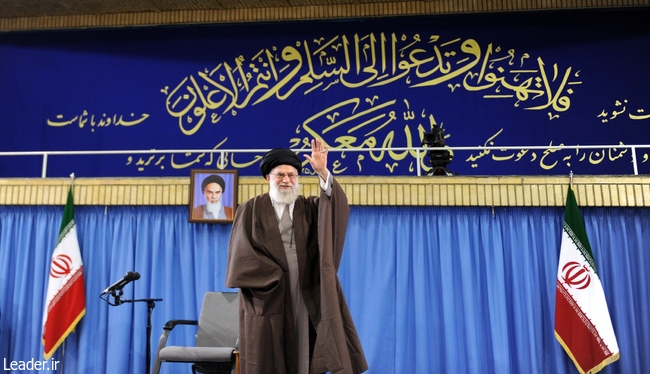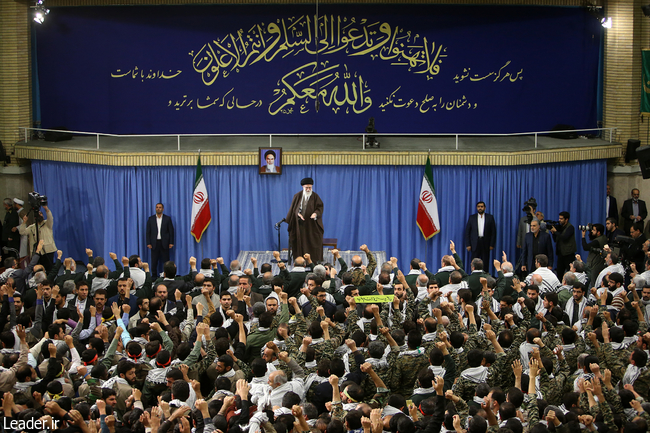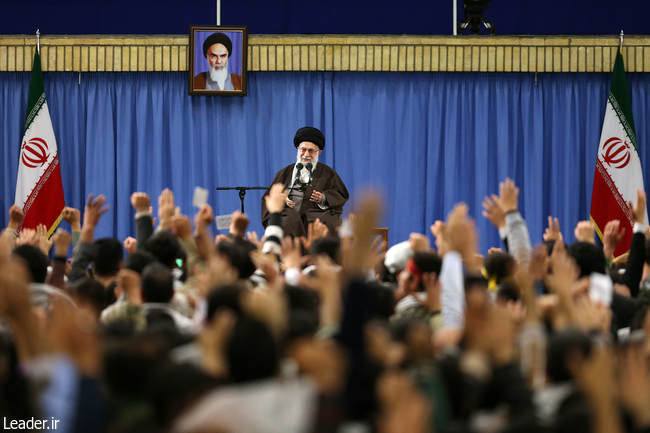Leader of the Islamic Revolution Ayatollah Seyyed Ali Khamenei met with thousands of the Basij forces on Wednesday, during which he described the Basij as the “army of the revolution,” and the “symbol of the religious democracy,” which relies on insight. While emphasizing the necessity of making accurate plans based on establishing deliberation boards to promote synergism among various layers of the Basij in order to ensure its powerful and influential presence in various social fields, Ayatollah Khamenei said, “The Basiji spirit means to always see God on your side and with you and never give in to despair and depression and deadlock. Therefore, in an answer to those weak people who have been afflicted with the fright of the enemy and the spirit of ‘we cannot’, we say that through reliance on the divine power and believing in the strength of people’s presence, we can overcome all problems without being afraid of any power.”
At the beginning of his remarks, Ayatollah Khamenei described the recent glorious Arba’een march as a “historic phenomenon” and the sign of “the powerful divine hand,” and noted, “In such lasting and huge phenomena and uprisings such as the Arba’een march or in such instances as the capture of [the former US embassy in Tehran, which is known as] the spy den, [people’s huge demonstration in support of the Islamic Republic on] the 9th of [the Iranian month] of Dei [December 30, 2009], and [also in case of] staying at mosques [on special days as an act of worship], which are not the results of propaganda, the hand of God can been seen more clearly than other places.”
The Leader mentioned the victory of the Islamic Revolution as another instance of these divine phenomena and pointed out, “[The presence of] this divine hand was totally evident and prominent in people’s presence and formation of the Islamic Revolution and the honorable Imam [Khomeini] also noted that ‘throughout the revolution I always saw the powerful divine hand behind the huge popular movement’.”
The Leader of the Islamic Revolution said the million-strong presence of people in the divine phenomenon of Arba’een was a sign of “love and attraction accompanied with insight” and added, “We welcome those pilgrims, who succeeded to do this great task, and we thank the people of Iraq, who kindly received and managed this huge population.”
The Leader said gratitude to God for this bounty is the necessary condition for the continuation and persistence of the extraordinary phenomenon of the Arba’een march, and said, “The real thanking [of God] must be done in practice, and just in the same way that the majority of the Iranian people protected the bounty of the Islamic Revolution with sacrifice and selflessness, the bounty of Arba’een must be appreciated through the preservation of spirits and states [of mind], which have been obtained during this illuminated trip, including brotherhood, compassion, attention to Velayat [guardianship of the religious leader] and readiness for presence in difficult arenas.”
Ayatollah Khamenei went on to note that some people in the world seek to eliminate or distort the illuminated phenomenon of Arba’een, but will never succeed in so doing and without a doubt, this great bounty for the Iranian and Iraqi nations will last and bring them honor and glory.
The Leader of the Islamic Revolution then mentioned the formation of the Basij force as one of the amazing phenomena related to the period of the Islamic Revolution and added, “The honorable Imam founded this pure tree through divine guidance and inspiration and put the youth in charge of [determining] the fate of the Islamic Revolution.”
The Leader further pointed to trustworthiness of the young people for transferring the “revolutionary spirit” from one generation to the next, noting, “Despite the fact that today’s youths have not seen the period of the revolution and the Imam, they are [still] present in the arena with the same revolutionary spirit and with an insight, awareness and experience, which outdoes the young people [who were present] in the early [years] of the revolution, and this is proof of the Islamic Revolution’s progress.”
Emphasizing that protecting and safeguarding the Islamic Revolution is a mission and task for all members of the nation, Ayatollah Khamenei described the youth as the driving force behind this great movement and added, “Certainly, the movement of the Basij in our country is victorious, but the [necessary] condition for the realization of this victory is to choose personal and collective piety and do good deeds, because these two important factors will attract God’s assistance and support.”
Referring to the Quranic example of the fight and struggle of Prophet Moses (PBUH) and his brother, Aaron, who stood up to the huge power of Pharaoh with empty hands, the Leader of the Islamic Revolution said, “God told Moses (PBUH): ‘Don’t be afraid because I am with you and hear and see’. Later on, Moses (PBUH) said in response to Israelites, who had been frightened after seeing the army of the Pharaoh and said ‘they will annihilate us’ that ‘Never! My Lord is with me and will guide me.”
The Leader mentioned piety and good deeds as the necessary condition for enjoying God’s assistance and stressed, “If we maintain the required conditions for this divine assistance, [the enemies] will not have the strength to overcome and dominate [us] even with a power ten times bigger than that of America.”
The Leader of the Islamic Revolution then enumerated five important topics, which must receive serious attention when the Basij force is making plans and procedures.
Reliance of the Basij force on “insight” was the first topic to which Ayatollah Khamenei alluded and said, “The Basij is not merely an emotional movement, but is based on understanding, knowing and insight and this orientation must be maintained within the force.”
Referring to some people, who were very enthusiastic and revolutionary in the early years after the Islamic Revolution, but are now standing against it, the Leader said, “These people greatly distanced from the Islamic Revolution and finally stood against the revolution due to ‘lacking religious depth, moving on the basis of emotions and companionship with those people who have differences with the revolution’.”
The Leader of the Islamic Revolution described “insight” as very important and pointed out, “The reason behind my frequent emphasis on [the importance of having] insight in the events [that took place after the presidential election] in [the Iranian calendar year, 1388] (2009), though some people were upset with this emphasis, was its importance in discerning the right path from the wrong one.”
Ayatollah Khamenei then mentioned the expanded domain of the Basij for all members of the nation and not being affiliated with any political faction as the second topic of his discussion and said, “The Basij is the army of the revolution and if there is a dichotomy in this regard, it is the dichotomy of ‘revolutionary’ as opposed to ‘counterrevolutionary’, because even a ‘non-revolutionary’ person can be attracted [to the path of the revolution].”
Putting emphasis on the need to attract as many people to the path of the revolution as possible, the Leader said, “Of course, this maximal attraction does not mean to take advantage of any method and measure but any faction or person, who believes in the revolution and serves the revolution, would be included in the Basij as well.”
The Leader of the Islamic Revolution then pointed out, “The Basij is not affiliated to any of the revolution’s factions, but it is a huge current and river, [which flows] towards the [achievement of] the goals of the Islamic Revolution.”
Ayatollah Khamenei mentioned the necessity of “synergism among various layers of the Basij,” as the third topic related to the movement of the Basij and added, “The [vast] expanse of the Basij includes various strata of people, in which a suitable mechanism for coordination and synergism must be worked out.”
The Leader of the Islamic Revolution then explained the fourth topic to ensure more powerful and influential presence of the Basij, saying that “the Basij is a symbol of religious democracy and is Islamic” in nature. The Leader added, “Some people assume that religious democracy is limited to going to the ballot boxes and participating in elections while this issue is just one of the manifestations of religious democracy and its real meaning is that ‘people are masters of the life in their society according to the religion of Islam’.”
Ayatollah Khamenei emphasized that on the basis of this definition, the Basij is symbol of religious democracy in all fields, adding, “Through this viewpoint, if the Basij enters the field of the Economy of Resistance and science, the Economy of Resistance and science will become democratic.”
The fifth and the last topic which the Leader of the Islamic Revolution highlighted, was the need to form deliberation boards at two levels, that is, the top and lower levels of the Basij.
Ayatollah Khamenei said, “The duty of these deliberation boards at various levels of the Basij is to make plans for various missions, including the hard war and the soft war and reconstruction and providing services [to people].”
Ayatollah Khamenei emphasized that the establishment of such deliberation boards will help the Basij become more dynamic, wiser, and more influential and will turn it into a pioneer in all fields. The Leader said, “In addition to deliberation boards, monitoring boards must be also established whose mission would be making sure not to let viruses infiltrate [into the Basij] and prevent [any form of] harm to the organization of the Basij.”
The Leader stressed that these five topics were necessary for the continued growth and fruition of the pure tree of the Basij, noting, “These topics are related to action and reality and should be put into action through accurate planning.”
The Leader of the Islamic Revolution also noted that the Basij is currently being used as a role model by certain regional countries, and while pointing to the enemy’s plan to deal a blow to this model, said, “One of the enemy’s plans is the very important issue of ‘infiltration’, about which frequent warnings have been issued since more than a year ago.”
Explaining how the enemy uses “infiltration” to deal a blow to the Basij, Ayatollah Khamenei said, “One of the tactics [used to achieve this goal] is to create parallel and rival lines for the Basij and some people in the country are currently trying to create rivals for the Basij.”
Referring to another point about the Basij, the Leader said, “We do not want the Basij to become a rival for the executive branch [of the government], but the Basij, as a complement and source of hope, can be present in practical arenas to show the correct direction to the executive branch and also help it.”
The Leader of the Islamic Revolution pointed to desperation expressed of some state-run bodies in certain fields, and noted, “How could [they] express despair given the background that exists for doing great jobs in the country and with the presence of an organization like the Basij? [Indeed] the name of the Basij will inspire any depressed and desperate person with hope and liveliness.”
Emphasizing that there is never a deadlock in the Basij, Ayatollah Khamenei said, “[Even] a Basiji might be overcome with fright or doubt at a certain juncture, but he will never face a deadlock, because power generating and guiding elements in the Basij are so numerous that they turn all weaknesses into strengths.”
The Leader pointed to the country’s economic problems and designation of the current Iranian calendar year as the year of “the Economy of Resistance, Action and Practical Steps,” and added, “Administration officials submitted a report on measures taken since the beginning of this year for the realization of the Economy of Resistance yesterday, in which figures and statistics related to measures that have been taken were mentioned, but the important point is that the result of these measure need to be seen in practice.”
The Leader of the Islamic Revolution emphasized that the Basij can help the Iranian administration in this regard.
In another part of his remarks, Ayatollah Khamenei focused on issues related to Iran and the arrogant government of the United States and said, “For the time being, it is not possible for us to pass a judgment on the new administration that is going to take office [in the United States], but the incumbent administration, acts to the opposite of what it has committed with regard to the JCPOA [Iran's nuclear deal with the P5+1 group of countries] and [also acts against] joint decisions that have been made, which at that time our officials told me that [the US] is acting [against the JCPOA] and has committed many violations.”
Referring to a [recent] positive vote by the US House of Representatives to a ten-year extension of the Iran Sanctions Act (ISA), the Leader noted, “If this extension is enforced and made operational, it would certainly be in breach of the JCPOA and [American officials must] know that the Islamic Republic of Iran will certainly show a reciprocal reaction.”
The Leader of the Islamic Revolution emphasized, “The nuclear agreement or the JCPOA must not turn into leverage for [mounting] pressure on the Iranian nation and country.”
Ayatollah Seyyed Ali Khamenei then referred to remarks made by Iran's officials and those in charge of the JCPOA, who said the main goal of the nuclear deal was to remove pressures and lift the sanctions, adding, “The US government has not only failed to fulfill those promises and obligations in the case of the JCPOA or [at best] has acted incompletely, something which officials in charge of the JCPOA have explicitlymentioned, it is now [also] using the JCPOA as leverage for renewed pressure on Iran.”
The Leader emphasized, “By relying on the divine might and through believing in the power of people’s presence, the Islamic Republic of Iran is not afraid of any power in the world.”
The Leader of the Islamic Revolution concluded his remarks by saying, “If there are some people, who would imitate the weak spirits of Israelites by saying that ‘we cannot’ and would be afraid of the enemy, we [for our turn] will follow suit with Prophet Moses (PBUH) and tell them in answer that this is never the case, because the Almighty God is with us and will guide us.”
Before the remarks of the Leader of the Islamic Revolution, Major General Mohammad Ali Ja'fari, the commander of the Islamic Revolution Guards Corps, stressed the need to boost the Islamic Revolution’s progressive capacities and added, “The Basij is strengthening itself and expanding and deepening the Islamic Revolution in various fronts of fighting deprivation, civil defense and scientific progress.”
General Ja'fari also declared readiness of the Basij forces to fight the enemy in various fields and said, “All of us, with one goal and one voice, will bring into the scene all our capabilities to serve the dignified strategy of the Economy of Resistance and the Basij will stand by the nation to the last in order to implement this sacred cause.”
Brigadier General Mohammad Reza Naqdi, the head of the Basij Organization, also took to the podium and while explaining the enthusiasm of the Basij force for fight and martyrdom, noted, “Thanks to the devoted resistance of the Basiji people of Iran, today, the force has turned into a model for all freedom seekers across the world.”
He also presented a report on the activities and achievements of the Basij in various fields, including the Economy of Resistance, and said, “The Basij forces will create such epics through the power of their faith and determination that enemies will have no choice but to admit failure and regret.”
During this meeting, Messrs. Reza Qamashlou and Mohammad Hossein Abbasi and Ms. Seyyedeh Marziyeh Rafa’ti, expressed their viewpoints as representatives of the Basij force and put emphasis on the following issues:
- The necessity for the continuation and strengthening of Circles of Saleheen (Pious People) educational plan;
- Importance of Rahiyan Nour (those who travel toward light) pilgrimage sites and the need for state officials to further support them and develop the necessary infrastructure;
- Role of schools in teaching and institutionalizing the Iranian and Islamic lifestyle; and
- Downsides of the cyberspace for adolescents and the need to take such necessary measures as launching the national information network.



